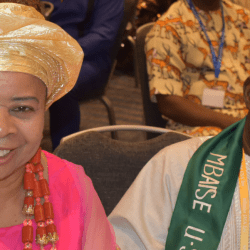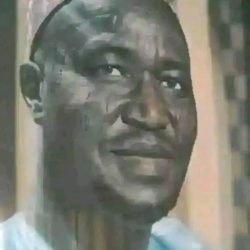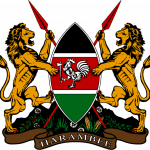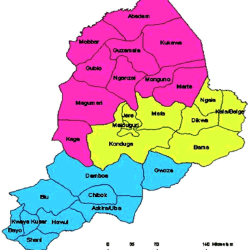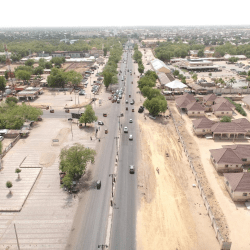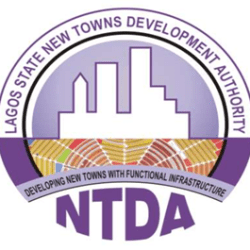People have been living in the Chad Basin Area even before the empire of Kanem Borno was founded in the 9th century. The Basin, which stretches from Tibesti Mountain in the north, the Mandara Mountains in the south, from the ancient town of Air in the west to Ennedi in the east, has an area of open water, which had once covered its wider parts. Although, the shorelines still vary, it has been relatively confined to its present size for over 4,000 years.
According to oral traditions, the Teda (Tibesti), Kanuri, Tomagrah and so on who lived around the lake and rivers were called Kanembu. Legends described them not only as giants and famous hunters but also as people who have founded towns.
Archeological evidences show that the early societies around the Lake were farmers and fisher men and the discovery of cattle and sheep bones at settlement sites indicate that animal husbandry was another economic activity. The presence of huge clay vessels in and around Borno towns of Ngala and Ndufu in Ngala Local Government Area proves the great skills in ceramic technology of the settlers. Some historical sites in Borno and outside have also revealed a great wealth of artifacts.
In the 9th century, Kanem Borno came to historical prominence when an Arab geographer, Ahmad Al-Yaqubi, mentioned it in his writings. By the 13th century, the empire had reached its peak, the Sayfawa rulers. Following that, a period of instability set in, leading to flight from their first base, Kanem in present-day Republic of Chad. They moved into Borno by the 15th century where they met, assimilated and displaced a group of loosely organized people, the Sau.
This would have been the time when the corpuses of oral traditions were formed. The ancient Sayfawa dynasty is said to be the longest ruling dynasty in man’s history.
Present day Borno State was created out of the defunct North-Eastern State in 1976 and further subdivided into two in 1991 when Yobe State was carved out of it to form the present State.
People and Languages
With a rich but diverse historical and cultural heritage, Borno State is pluralistic in ethnic composition. About thirty languages are considered autonomous languages; those whose speakers have either lived for a long time in the state or those who live permanently or even exclusively or who have majority of their speakers now outside the state. Linguists classify twenty six of the Chadic languages spoken in Borno. The Kanuri with rich cultural heritage is however an exception and a member of Saharan group of languages and are found predominantly in the Central and Northern parts of the state, which forms the present Borno and Dikwa Emirates. The Fulfulde is an Arab language of considerable antiquity while Arabic is mainly spoken by the Shuwa Arabs. The Babur/Bura, rich in oral tradition and the second largest ethnic group mostly inhabit Biu Emirate in the southern part of the state. Distinct in language and culture, the Babur/Bura have a lot in common with the Kanuri and centuries of interaction with Borno Emirate have left many marks. Kingship traditions of today appear similar to that of Borno Emirate.
Gwoza is cosmopolitan in nature with a great number of languages and has cultural links with the people living in Cameroon. They were in the former German Cameroon and after the First World War, came under trusteeship of the League of Nations and later under the United Nations Organizations with the United Kingdom administering it. When a plebiscites was held in 1961 after Nigeria’s independence in 1960, Gwoza opted to join the nation of Nigeria. Gwoza has a conglomeration of languages. The major ones are Glavda, Jehode, Mandara and Waha.
Askira and Uba Emirates came into existence as independent emirates as a result of boundary adjustment. In 1921 when there was a boundary adjustment between the provinces of Borno and Adamawa, a piece of land was given to Mai Maina under the seal of King George in recognition of his service to the British Crown. He virtually became the founding father of the town and Emirate of Askira. Like the Gwoza Emirate, Uba Emirate is also cosmopolitan in nature as the Marghi language is further divided into dialectical “tonati” and is mostly inhabited by the Dera. They record a long list of capable leaders, Billa Wati being the first ones grouped mainly under the North and South of Marghi-speaking people.
Borno
Borno is a state in Nigeria.
It’s one of the six states that form the North-East geopolitical zone of Nigeria.
Borno shares international borders to the North with Niger and Chad as well as with Cameroon to the East. Its Southern and Western borders are shared with Adamawa, Gombe and Yobe States. Maiduguri is the state capital.
State capital: Maiduguri
Local Government Areas: 27
Landmass: 57,798.1 sq km (22,316 sq mi) – 1st of 37
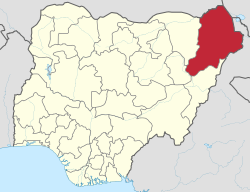
LANDMASS, LOCATION
Borno State has an area of 57,798.2 square kilometres.
It lies roughly at latitude 11°30’ North and longitude 13°00’ East.
HISTORY AND PEOPLE
The first settlers of Borno State were the Teda (Tibesti), Kanuri and Kanembu who lived around the state’s lake and rivers. These people were also called Sao. The Sefawa later displaced them in the fifteenth and sixteenth centuries.


Borno State has its roots in the move by the Saifawa rulers (Mais) of El Kanemi to the area west of Lake Chad in the fourteenth century. These people were referred to as the people from Bahr-el Nur; this name was later corrupted to Borno. It was under the Mais that the Kanuri emerged as a nation. The Fulani jihad of the nineteenth century greatly weakened the authority of the Mais who were eventually displaced by Muhammed El-Amin lbn El-Kanemi, a Kanembu Islamic scholar who established the El-Kanemi dynasty, took the title of Shehu and transferred the capital to Kukawa. Rabeh, a Shuwa Arab, sacked much of Borno in 1893 and became its ruler, transferring the capital to Dikwa.
European colonisation in the last decade of the nineteenth century led to Rabeh’s defeat and the dismemberment of the Borno Empire. Following its division between the British and the French at the turn of the twentieth century, Borno State became part of Northern Nigeria. It was part of the Northern Region in the three-region structure of 1954 and part of North-Eastern State following the establishment of twelve federal states by General Yakubu Gowon’s military government. It was established as its own entity in 1976 following the dissolution of the North-Eastern State. The state’s borders were further adjusted when Yobe was excised from it in 1991.
Borno State is heterogeneous with twenty-eight (mostly Chadic) languages. The Shuwa Arabs, Kanuri and Marghi are the most represented people in the state and Kanuri is its dominant language. Other ethnic groups include the Hausa, Fulani and a number of tribes from southern Nigeria. Islam is the major religion in the state. There is a Christian minority concentrated around Maiduguri.
CULTURE
The people of Karai-Karai and two other tribes in Potiskum, Nangere and Fika local government areas mark the Barakau festival in June and September every year. During the festival, the people kill a cock of over one year old and splash its blood on the farm implements of each household.
Other cultural activities include the Durbar and Menwara festivals. The durbar festival is marked with display of horsemanship and reflects the state cultural diversity.
MAJOR TOWNS AND CITIES
Maiduguri (capital), Biu, Bama and Dikwa.
LOCAL GOVERNMENT AREAS

GOVERNORS
Musa Usman (Governor– Military): May 1967 – July 1975
Muhammadu Buhari (Governor– Military): July 1975 – March 1976
Mustapha Amin (Governor – Military): March 1976 – July 1978
Tunde Idiagbon (Governor– Military): July 1978 – October 1979
Mohammed Goni (Governor – Civilian (Great Nigerian People’s Party)): October 1979 – October 1983
Asheik Jarma (Governor – Civilian (Nigerian People’s Party)): October 1983 –December 1983
Abubakar Waziri (Governor– Military): January 1984 – August 1985
Abdulmumini Aminu (Governor – Military): August 1985 – December 1987
Abdul One Mohammed (Governor – Military): December 1987 – December 1989
Mohammed Maina (Governor – Military): December 1989 – June 1990
Mohammed Marwa (Governor – Military): June 1990 – January 1992
Maina Lawan (Governor – Civilian (Social Democratic Party)): January 1992 – November 1993
Ibrahim Dada (Administrator – Military): December 1993 – August 1996
Victor Ozodinobi (Administrator – Military): August 1996 May –1997
Augustine Aniebo (Administrator – Military): May 1997 – August 1998
Lawal Haruna (Administrator – Military): August 1998 – May 1999
Mala Kachalla (Governor – Civilian (All People’s Party/; All Nigeria People’s Party)): May 1999 – May 2003
Ali Sheriff (Governor – Civilian (All Nigeria People’s Party/People’s Democratic Party)): May 2003 – May 2011
Kashim Shettima (Governor – Civilian (All Nigeria People’s Party)/All Progressive Congress): May 2011 – May 2019
Babagana Zulum (Governor – Civilian (All Progressive Congress)): May 2019 – Present
ECONOMY
Borno State is primarily an agrarian society. The majority of the people are farmers, herdsmen and fishermen. There is also considerable local trade in sorghum, millet, corn (maize), rice, cotton and indigo.
The state is the most important livestock-producing area in Nigeria, an industry dominated by the Fulani and Shuwa. Livestock (mainly cattle with some goats and sheep), cattle hides, goatskins and sheepskins, finished leather products, dried fish, crocodile skins, groundnuts and gum arabic are all exported from Maiduguri.
Cattle rearing and poultry farming take place in the surrounding countryside, as does fishing along the shores of Lake Chad and the Yedseram river. Other local industries include cotton weaving, dyeing and the tanning of leather.

The mineral resources found in the state include clay, salt, potash, limestone, kaolin, sandstone, iron ore, uranium, quartz, magnesite, mica and granite.
EDUCATION
The tertiary institutions in the state are University of Maiduguri, Borno State University, Maiduguri, Ramat Polytechnic, Maiduguri, Sir Kashim College of Education, Waka Biu; Umar Ibn Ibrahim El Kanemi College of Education, Science and Technology, Bama; Mohammet Lawan College of Agriculture, Maiduguri; Mohammed Goni College of Legal and Islamic Studies, Borno College of Agriculture and the Federal Staff Training Centre, Maiduguri.
FAMOUS SITES
Chad Basin Natural Park, Chingurmi-Duguma

The park has three parts.
In the Chingurmi-Duguma area of the park 66 species of birds have been recorded such as the black-crowned crane, pallied harrier, African-collared dove among others.
The Bula Tura Oasis area is a number of swampy valley called oases and is home to some rare desert wildlife which include ostrich, glossy ibis, ratel, and mongoose.
The Bada Nguru Wetlands area has the Dagona Waterfowl Santuary. The sanctuary is significant as it is host to migrant European birds that flock there in the thousands every year as they escape Europe’s winter.
Biu Plateau, Biu

The Biu plateau contains a number of extinct volcanoes.
It is the source of many tributaries of the Gongola River. It has an average elevation of 2,300 feet and covers 5,200 square kilometres.
Do Rabeh’s Fort, Dikwa

Located in Dikwa town, Rabeh Fort is a 125-year-old monument that depicts the rich cultural heritage of the people of Borno State.


